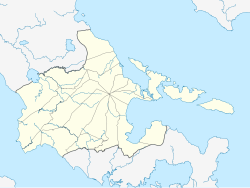Tabaco Church
| Tabaco Church | |
|---|---|
| Saint John the Baptist Parish Church | |
| |
 Church facade in 2010 | |
Location in Luzon | |
| 13°21′35″N 123°43′45″E / 13.359647°N 123.729137°E | |
| Location | Tabaco, Albay |
| Country | Philippines |
| Denomination | Roman Catholic |
| History | |
| Status | Parish church |
| Founded | 1664 (as a Parish) |
| Dedication | Saint John the Baptist |
| Architecture | |
| Functional status | Active |
| Heritage designation | National Cultural Treasure |
| Architectural type | Church building |
| Style | Baroque |
| Administration | |
| Province | Caceres |
| Archdiocese | Caceres |
| Diocese | Legazpi |
| Clergy | |
| Archbishop | Rolando Joven Tria Tirona |
| Bishop(s) | Joel Z. Baylon |
| Priest(s) | Rev. Fr. Eduardo R. Ramin, Jr. |
The Saint John the Baptist Parish Church (Template:Lang-es), commonly known as Tabaco Church, is a Roman Catholic church in the city of Tabaco, Albay, Philippines under the jurisdiction of the Diocese of Legazpi.
The church of Tabaco was founded by the Franciscans under the advocacy of Saint John the Baptist and became an independent parish in 1616. It was also declared a National Cultural Treasure of the Philippines.
History
Tabaco was established as a visita by the Franciscans under the patronage of Saint John the Baptist in 1587.[1][2] It was separated from Cagsaua in 1616 when Father Pedro de Alcareso was named as parish priest.[1][3] It was administered by the Franciscans until 1660.[1] It became an independent parish in 1664.[2] Since 1750, the church was supervised by the secular clergy.[2] The present church was built by the seculars in 1864 and completed in 1879.[3][4]
The church, one of the only two declared sites in Bicol Region, was categorized by the National Museum of the Philippines as a National Cultural Treasure of the country.[5] Its marker was unveiled on June 22, 2012.[6]
Features

The church is built out of dark volcanic soil and stones found in the area. One unusual characteristic of the church is the presence of mason's marks on stones used for the construction of the church building, a rare feature in the Philippines.[4] Its unusual floor plan contains compartments for which there is currently no explanation.[4] It is known for its beautiful and bell tower embedded with rococo designs.[4]
Rehabilitation
Albay Governor Joey Salceda allotted ₱ 35 million for the rehabilitation of the historical and cultural heritage sites in the province including the Tabaco church.[7]
Notes
- ^ a b c Huerta 1865, p. 590
- ^ a b c National Historical Institute 1993, p. 65
- ^ a b "St. John the Baptist Church, Tabaco". WOW Legazpi. Legazpi City Tourism Office. Retrieved September 11, 2014.
- ^ a b c d Alba, Reinerio (September 29, 2003). "The Restoration of 26 Philippine Churches". National Commission for Culture and the Arts. Archived from the original on September 3, 2014. Retrieved September 15, 2014.
- ^ Cruz, Jasmine (May 8, 2014). "Searching for cultural treasures". BusinessWorld. Archived from the original on September 23, 2015. Retrieved September 14, 2014.
- ^ National Museum of the Philippines. (2012) Annual Report 2012
- ^ Tariman, Pablo (May 5, 2014). "Albay's heritage saving efforts highlight observance of Heritage Month". Yahoo News Philippines. Retrieved September 11, 2014.
Bibliography
- Huerta, Felix (1865). Estado geográfico, topográfico, estadístico, histórico-religioso (in Spanish). Binondo: Imprenta de M. Sanchez y Ca.
- Historical markers: Regions V-XII. Manila: National Historical Institute. 1993. p. 65. ISBN 9789715380690.
External links
 Media related to Saint John the Baptist Church (Tabaco) at Wikimedia Commons
Media related to Saint John the Baptist Church (Tabaco) at Wikimedia Commons- Tabaco Church on Facebook
- Roman Catholic churches in Albay
- 1616 establishments in the Philippines
- Roman Catholic churches completed in 1879
- 1870s establishments in the Philippines
- National Cultural Treasures of the Philippines
- Baroque Revival architecture
- Spanish Colonial architecture in the Philippines
- 19th-century Roman Catholic church buildings in the Philippines
- Churches in the Roman Catholic Diocese of Legazpi




